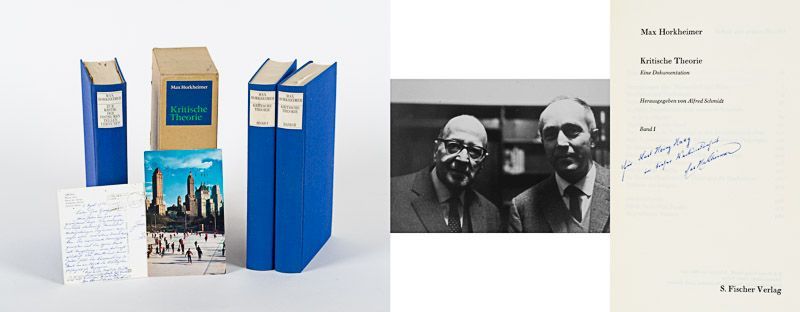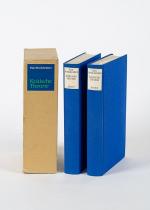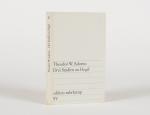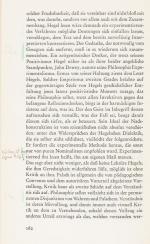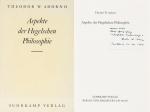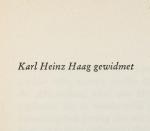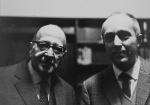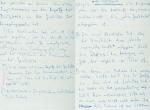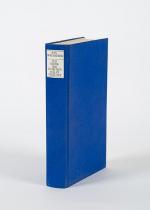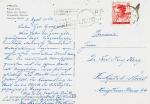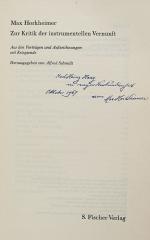[Adorno, Wichtige Sammlung von Widmungsexemplaren / Arbeitsexemplaren der Frankf
Wichtige Frankfurter Schule-Sammlung von sehr bedeutenden Arbeitsexemplaren / Widmungsexemplaren / Autorenexemplaren, Autographen und Manuskript-Notiz-Zetteln des deutschen Philosophen Karl-Heinz Haag. Die Arbeitsexemplare (Sieben Buchtitel in neun (9) Bänden) und handschriftlichen Notizen und Autographen (Postkarten), stammen aus der privaten Bibliothek des Adorno und Horkheimer- Schülers, Karl-Heinz Haag. Die in der Sammlung enthaltenen Manuskript-Notizen und Autographen (Postkarten von Horkheimer) sind inhaltsreich und teilweise auch deshalb sehr bedeutend, weil es unter Insidern bekannt ist, dass Haag auch während seiner aktiven Zeit innerhalb der Frankfurter Schule notorisch wenig veröffentlicht und schriftlich kommentiert hat. Beiliegt ausserdem ein Zeitungsausschnitt zur Adorno-Lehrstuhl-Nachfolge. / Important, stunning collection of seven, signed or/and annotated association-copies (working-copies) from the private library of german philosopher Karl-Heinz Haag. Haag was pupil, friend and colleague of Adorno and Horkheimer and was one of the members of the Frankfurt School of Social Theory and Social Research. The collection of annotated books (Seven Booktitles in nine (9) volumes) also includes ephemera (Autograph postcards, newspaper-clipping, as well as several manuscript – pages of significant notes and thoughts by Karl-Heinz Haag regarding topics discussed in some of these publications). The collection is especially important because Haag published and commented notoriously little during and after his tenure in Frankfurt. [See complete set of photographs of this collection on our website].
Frankfurt u.a., Suhrkamp / Institute of Social Research / Kohlhammer etc., 1955 – 1972. Octavo. Paginierung / Collation: 1. Adorno – Aspekte der Hegelschen Philosophie (Inscribed, signed): 59 Seiten mit zahlreichen Annotationen /59 pages, heavily annotated / 2. Haag – Kritik der neueren Ontologie (Author’s copy): 59 Seiten / 59 pages / 3. Adorno – Drei Studien zu Hegel (Inscribed, signed): 172 Seiten mit zahlreichen Annotationen / 172 pages with annotations / 4. Horkheimer – Zur Kritik der instrumentellen Vernunft (Inscribed, signed): 353 Seiten mit vielen Anmerkungen und Anstreichungen / 353 pages, heavily annotated / 5. Horkheimer – Kritische Theorie (Inscribed, signed): XIV, 376, XI, 358 Seiten mit zahlreichen Anmerkungen und Anstreichungen / XIV, 376, XI, 358 pages, heavily annotated / 6. Schweppenhäuser – Tractanda (Inscribed, signed): 141 Seiten / 141 pages. Original Softcover and Hardcover – Volumes. Sehr guter Erhaltungszustand aller Publikationen mit teilweise eingelegten, handschriftlichen Notizen sowie ein alter Zeitungsartikel in dem der Zersetzungsprozess der Frankfurter Schule kommentiert wird. / All publications in very good condition with minor signs of wear. Amazing provenance and possibly one of the last important collections surfacing from the library of a member of the Frankfurt School. The inter-connection between Adorno – Haag – Horkheimer, reflected in Haag’s annotations, lends itself for study and new publications of criticism.
The collection of working-copies includes (chronologically) / Die Sammlung der Arbeitsexemplare enthält (chronologisch nach Erscheinungsdatum):
1. Walter Benjamin:
″Schriften” – Band I und II mit umfangreichen, handschriftlichen Annotationen und interessanten Kommentaren im Kapitel “Geschichtsphilosophische Thesen” und im Kapitel “Über Sprache überhaupt und über die Sprache des Menschen” (1955).
Mit handschriftlichem Besitzvermerk von Karl-Heinz Haag in Band I und kleinem Photo von Walter Benjamin auf dem Titelblatt eingeklebt.
2. Theodor W. Adorno:
″Aspekte der Hegelschen Philosophie (1957)” – Mit handschriftlicher Widmung von Adorno (voll signiert) an Karl-Heinz Haag.
[″Meinem lieben Karl-Heinz Haag in herzlicher Verbundenheit – Theodor W. Adorno – Frankfurt, 14. Mai 1957”]
3. Karl Heinz Haag:
″Kritik der neueren Ontologie – [1956]” – Karl Heinz-Haag’s persoenliches Handexemplar seiner Habilitationsschrift mit seinem Namenszug auf dem Vorsatzblatt und einer nicht verifizierbaren Original-Photographie eingeklebt im Innendeckel
4. Theodor W. Adorno:
″Drei Studien zu Hegel (1963)” – Mit einer sehr persönlichen, handschriftlichen Widmung von Adorno [″Meinem lieben Karl Heinz Haag als ehrliches Zeichen herzlicher Verbundenheit – von seinem Adorno – Frankfurt, 20.September 1963”]
Der Hegel-Titel (″Drei Studien”) von Adorno, beinhaltet ausserdem die gedruckte Widmung von Adorno an Haag: “Karl Heinz Haag gewidmet” und die Ausgabe ist somit Zeichen ultimativer Assoziierung zwischen zwei bedeutenden Philosophen der Frankfurter Schule.
Wichtig: Mit Annotationen und Anstreichungen von Karl-Heinz Haag im Text und beiliegend einem zwei-seitigen Manuskript – Merkzettel mit Gedanken von Haag zu “Hegels panth. Metaphysik”
5. Max Horkheimer :
″Zur Kritik der instrumentellen Vernunft” [Deutsche Ausgabe (1967) von “Eclipse of Reason” (1947)]
Aus den Vorträgen und Aufzeichnungen seit Kriegsende. [Widmungsexemplar, voll signiert von Max Horkheimer an seinen ehemaligen Studenten und Doktoranden Karl-Heinz Haag:
″Karl-Heinz Haag in enger Verbundenheit – Oktober 1967 von Max Horkheimer” – Die bedeutende Ausgabe diente als Handexemplar von Haag und ist mit zahlreichen, sehr interessanten Annotationen und Anstreichungen versehen.
Beiliegend zu diesem Werk:
A. Zwei handschriftliche, voll signierte Postkarten von Horkheimer an Haag (aus New York und Verona):
- 2.April 1962 aus Verona: “Lieber Herr Haag – Wir haben ein paar gute geruhsame Tage….vor allem Soave trinken, die civilisierte Atmosphaere geniessen……wir sind sehr gluecklich. Der Markt mit seinen Zelten hift, der Verwandlung der Stadt in ein Objekt der Bildungsbeflissenheit zu begegnen…..″
B. Originale Manuskript -Seiten (handschriftliche Notizen auf vier (4) A5 – grossen Merk-Zetteln) von Karl-Heinz Haag zu Textstellen der folgenden Werke:
- “Zur Kritik der instrumentellen Vernunft”
- “Kritische Theorie I – II″
- “Dialektik der Aufklärung″
- “Sozialphilosophische Studien″
- “Die Sehnsucht nach dem ganz Anderen″
- “Verwaltete Welt” [″Trauer als das negative Bewahren theologischer Kategorien”]
- “Religion und Philosophie″
- “Schopenhauer″
C. Eine sechs-seitige-Rezension des Werks “Zur Kritik der instrumentellen Vernunft” von Kurt Juergen Huch mit ausfuehrlicher Widmung an Karl-Heinz Haag (siehe Photo)
D. Fuer Karl-Heinz Haag wohl wichtiger Zeitungs-Artikel aus dem Spiegel des Jahres 1972: “Apos Erben”, in welchem das Uebergehen Haags als Adorno-Lehrstuhl-Nachfolger durch die Vorstellung des “Positivisten” Hans Albert manifestiert wird.
6. Max Horkheimer:
″Kritische Theorie – Eine Dokumentation” (1968 – Band I und Band II im Schuber)
[Widmungsexemplar, voll signiert von Max Horkheimer: “Für Karl Heinz Haag in tiefer Verbundenheit – Max Horkheimer” – Mit montierter Originalphotographie auf dem Zwischentitel von Band I, auf welcher Horkheimer und Haag vereint in die Camera schauen [Eine weitere Photographie ist auf dem Zwischentitel von Band II montiert und zeigt das Grab von Horkheimer]
Die Ausgabe ist ebenfalls das Handexemplar von Haag mit beiliegendem Merkzettel zu Textstellen sowie Anstreichungen und Anmerkungen (auf Seite 246: “Wie aber ist Dialektik [Dial.] dann noch möglich ?”)]
7. Hermann Schweppenhäuser:
″Tractanda- Beiträge zur kritischen Theorie der Kultur und Gesellschaft” (1972)
Mit handschriftlicher Widmung [″Fuer Karl-Heinz Haag in stetem freundschaftlichen Gedenken von seinem Hermann Schweppenhäuser – 18.Mai 1972”]
_______________________________________________________________________________________
The Frankfurt School (German: Frankfurter Schule) was a school of social theory and critical philosophy associated with the Institute for Social Research, at Goethe University Frankfurt. Founded in the Weimar Republic (1918–33), during the European interwar period (1918–39), the Frankfurt School comprised intellectuals, academics, and political dissidents dissatisfied with the contemporary socio-economic systems (capitalist, fascist, communist) of the 1930s. The Frankfurt theorists proposed that social theory was inadequate for explaining the turbulent political factionalism and reactionary politics occurring in 20th century liberal capitalist societies. Critical of capitalism and of Marxism–Leninism as philosophically inflexible systems of social organization, the School’s critical theory research indicated alternative paths to realizing the social development of a society and a nation.
The Frankfurt School perspective of critical investigation (open-ended and self-critical) is based upon Freudian, Marxist and Hegelian premises of idealist philosophy. To fill the omissions of 19th-century classical Marxism, which did not address 20th-century social problems, they applied the methods of antipositivist sociology, of psychoanalysis, and of existentialism. The School’s sociologic works derived from syntheses of the thematically pertinent works of Immanuel Kant, Georg Wilhelm Friedrich Hegel, and Karl Marx, of Sigmund Freud and Max Weber, and of Georg Simmel and Georg Lukács.
Like Karl Marx, the Frankfurt School concerned themselves with the conditions (political, economic, societal) that allow for social change realized by way of rational social institutions. Their emphasis on the critical component of social theory derived from their attempts to overcome the ideological limitations of positivism, materialism, and determinism by returning to the critical philosophy of Kant and his successors in German idealism – principally the philosophy of Hegel, which emphasized dialectic and contradiction as intellectual properties inherent to the human grasp of material reality.
Since the 1960s, the critical-theory work of the Institute for Social Research has been guided by Jürgen Habermas’s work in communicative rationality, linguistic intersubjectivity, and “the philosophical discourse of modernity”; Critical theorists Raymond Geuss and Nikolas Kompridis have opposed Habermas’s propositions, claiming he has undermined the original social-change purposes of critical-theory-problems, such as what should reason mean; analysis of the conditions necessary to realize social emancipation; and critiques of contemporary capitalism. (Wikipedia)
Karl Heinz Haag (* 17. Oktober 1924 in Höchst am Main † 14. April 2011 in Wiesbaden) war ein deutscher Philosoph.
Nach dem Studium der Philosophie und Theologie an der von den Jesuiten getragenen Philosophisch-Theologischen Hochschule Sankt Georgen promovierte er 1951 bei dem aus dem Exil zurückgekehrten Max Horkheimer an der Johann-Wolfgang-Goethe-Universität in Frankfurt am Main mit einer Arbeit über Die Seinsdialektik bei Hegel und in der scholastischen Philosophie (veröffentlicht 2012). 1956 habilitierte er sich dort mit einer Arbeit über die neuere Ontologie. In den folgenden Jahren lehrte Haag zunächst als Privatdozent und später als außerplanmäßiger Professor in den klassischen Fächern der Philosophie. Seit 1972 widmete er sich ausschließlich der philosophischen Forschung. Karl Heinz Haag lebte in Frankfurt-Höchst. (Wikipedia)
Theodor W. Adorno ( born Theodor Ludwig Wiesengrund; September 11, 1903 – August 6, 1969) was a German philosopher, sociologist, and composer known for his critical theory of society.
He was a leading member of the Frankfurt School of critical theory, whose work has come to be associated with thinkers such as Ernst Bloch, Walter Benjamin, Max Horkheimer and Herbert Marcuse, for whom the works of Freud, Marx, and Hegel were essential to a critique of modern society. He is widely regarded as one of the 20th century’s foremost thinkers on aesthetics and philosophy, as well as one of its preeminent essayists. As a critic of both fascism and what he called the culture industry, his writings—such as Dialectic of Enlightenment (1947), Minima Moralia (1951) and Negative Dialectics (1966)—strongly influenced the European New Left.
Amidst the vogue enjoyed by existentialism and positivism in early 20th-century Europe, Adorno advanced a dialectical conception of natural history that critiqued the twin temptations of ontology and empiricism through studies of Kierkegaard and Husserl. As a classically trained pianist whose sympathies with the twelve-tone technique of Arnold Schoenberg resulted in his studying composition with Alban Berg of the Second Viennese School, Adorno’s commitment to avant-garde music formed the backdrop of his subsequent writings and led to his collaboration with Thomas Mann on the latter’s novel Doctor Faustus, while the two men lived in California as exiles during the Second World War. Working for the newly relocated Institute for Social Research, Adorno collaborated on influential studies of authoritarianism, antisemitism and propaganda that would later serve as models for sociological studies the Institute carried out in post-war Germany.
Upon his return to Frankfurt, Adorno was involved with the reconstitution of German intellectual life through debates with Karl Popper on the limitations of positivist science, critiques of Heidegger’s language of authenticity, writings on German responsibility for the Holocaust, and continued interventions into matters of public policy. As a writer of polemics in the tradition of Nietzsche and Karl Kraus, Adorno delivered scathing critiques of contemporary Western culture. Adorno’s posthumously published Aesthetic Theory, which he planned to dedicate to Samuel Beckett, is the culmination of a lifelong commitment to modern art which attempts to revoke the “fatal separation” of feeling and understanding long demanded by the history of philosophy and explode the privilege aesthetics accords to content over form and contemplation over immersion. (Wikipedia)
- Keywords: Adorno · Adorno – Collection · Adorno, Theodor Wiesengrund · Arbeitsexemplar · Association Copy · Catalogue Twelve – Philosophy · Collection Philosophy Rare · Frankfurt school · Frankfurter Schule · Horkheimer · Inscribed · Karl-Heinz Haag (Adorno Circle) · Manuscript / Autograph – Rare · Manuscript Material – Rare · Manuscript Philosophy Rare · Manuscript signature · Manuscripts · Manuskript · Philosophy Rare · Signed · Signiert · Sociology – Rare · Soziologie · Widmung · Widmungsexemplar
- Language: Deutsch
- Inventory Number: 31816AB
EUR 10.400,--
© 2025 Inanna Rare Books Ltd. | Powered by HESCOM-Software





